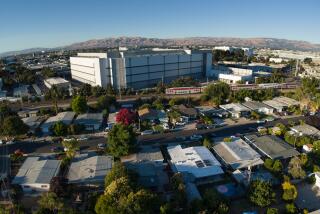Making connections
A HIGH-SPEED INTERNET CONNECTION for every computer may be the 21st century equivalent of âa chicken in every pot.â Itâs a utopian-sounding promise that local officials are making across the country, with projects underway in Philadelphia, San Francisco, Anaheim and Long Beach, among other cities.
The idea isnât new -- a number of smaller towns and rural communities built their own fiber-optic networks in the 1990s in the hope of recruiting high-tech businesses. Many of those efforts were busts because of the prohibitive cost of the networks and the equipment needed to connect.
With wireless technologies slashing the cost of building a broadband network, however, high-speed Internet access is increasingly being seen as more than just a competitive advantage for cities large and small. Given the World Wide Webâs growing prominence in employment, commerce, education, healthcare and city services, Internet access is becoming a utility as basic and important as phone service.
Nevertheless, there are plenty of reasons for local governments not to do the job themselves. In addition to facing the nontrivial expense and risk of operating and maintaining a network, a city would be putting itself in direct competition with the privately owned telephone and cable TV companies that offer Internet access. Thatâs not likely to be a fair fight. Thereâs also a minefield of problems involving privacy, security and pirated or inappropriate material online.
Philadelphia is taking a different approach. It is negotiating a deal with Internet service provider Earthlink to make affordable wireless Internet access available throughout the city on a network built and owned by Earthlink. The company would assume all the risk, and some of the proceeds would be used to offer subsidized Internet access and computers to low-income residents.
Mountain View, Calif., meanwhile, struck a different kind of deal. It has an agreement with Google that will make wireless Internet access available for free throughout the Silicon Valley suburb, with no city funds involved.
In essence, Philadelphia and Mountain View are taking advantage of the problems that federal regulators and the courts have created for Internet service providers such as Earthlink and Web-based companies like Google.
Recent rulings allow cable TV and phone companies, once forced to share their networks with the likes of Earthlink, to sell high-speed Internet service exclusively through their own Internet providers. And those providers can (and do) steer customers to their partnersâ websites, not necessarily to Google. Thatâs why the companies are powerfully motivated to create their own networks.
The best way to keep the cable-and-phone duopoly honest, on both prices and content, is to provide consumers more choices. And if municipalities can do that without using taxpayer dollars or competing directly with private industry, they should. As Los Angeles and other cities flirt with providing broadband access, they should follow the models being developed by Philadelphia and Mountain View.






